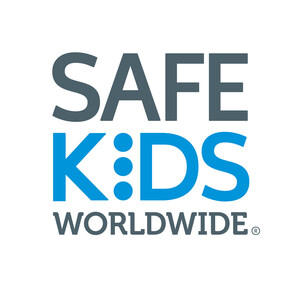Children Alone in Vehicles Can Quickly Lead to Tragedy
Safe Kids Worldwide Urges Citizens to "ACT" to Avoid Heat Stroke-Related Deaths
BOCA RATON, Fla., April 17, 2012 /PRNewswire-USNewswire/ -- Every year, children die of hyperthermia, also known as heat stroke, while unattended in vehicles. The number of near-misses – children rescued before a fatality – is significantly higher. To help prevent these tragic and unnecessary deaths, Safe Kids Worldwide and the General Motors Foundation are launching their 2012 hyperthermia awareness campaign, Never Leave Your Child Alone In a Car.
"Whether you are a parent or caregiver, or just a concerned bystander, you can help save lives," says Kate Carr, President and CEO of Safe Kids Worldwide. "We are urging everyone to ACT: Avoid hyperthermia-related deaths by never leaving your child alone in a car and always locking doors and trunks; Create reminders and habits for you and your child's caregivers to serve as a safety net to ensure you don't forget your child; and Take action if you see a child unattended in a vehicle by immediately calling 911."
Safe Kids warns that these deaths can happen anytime, anywhere. With the support of the GM Foundation, Safe Kids Worldwide and its network of 600 coalitions and chapters across the nation are helping to educate parents and caregivers by providing prevention information.
"Children have died in hot cars in winter months as well as summer months, and in nearly all 50 states," says GM Foundation President Vivian Pickard. "These tragic, yet preventable events happen more often than one would think; in fact more than 500 children have died this way since 1998."
Even on a seemingly mild day, temperatures inside a car can rise nearly 20 degrees in 10 minutes, and leaving a window slightly open has no effect. These conditions are especially dangerous for children, whose bodies heat up three to five times faster than an adult's. Heat stroke happens when the body cannot cool itself fast enough and the core temperature rises to dangerous levels.
"Kids react differently to heat than adults," says Dr. Leticia Ryan of Children's National Medical Center, Emergency Medicine and Trauma Services. "Infants and young children haven't fully developed the internal systems regulating body temperature, putting them at much greater risk for organ failure and death when exposed to excessive heat. We see this all too often in the emergency room, and it's absolutely devastating."
Since 1998, more than half of fatalities occurred when a distracted caregiver forgot their child was in the car. Thirty percent occurred when a child was playing in an unattended vehicle and became trapped and seventeen percent were intentionally left.
When these tragedies strike, they shatter lives. Dr. Norman Collins, Sr. saw this in his own family, when, on a Sunday morning, a miscommunication between his son and another churchgoer resulted in his grandson dying in a car in a church parking lot. "My grief at the loss of my grandson, Bishop, was compounded by the agony of seeing my son and his wife grieving," says Dr. Collins. "I have thought so many times how effective and valuable prevention messages would have been toward saving Bishop. If I can help save even one life, I'll do what I can."
To spread the word as broadly as possible, Safe Kids Worldwide and its state-based coalitions are mobilizing their network of partners – police and fire departments, hospitals and doctors' offices, government agencies, childcare centers, businesses and others – to alert citizens to the grave dangers that hot vehicles pose to children. Safe Kids also supports NHTSA's hyperthermia education campaign and welcomes the increased national coordination on the issue.
Together, we can cut down the number of deaths and near-misses by remembering to ACT.
- Avoid heat stroke-related injury and death by:
- Never leaving your child alone in the car, even for a minute.
- Consistently locking unattended vehicle doors and trunks.
- Create reminders and habits that give you and your child's caregiver a safety net:
- Establish a peace-of-mind plan. When you drop off your child, make a habit of calling or texting all other caregivers, so all of you know where your child is at all times.
- Place a purse, briefcase, gym bag, cell phone or an item that is needed at your next stop in a back seat.
- Set the alarm on your cell phone or computer calendar as a reminder to drop your child off at childcare.
- Take action if you see an unattended child in a vehicle:
- Dial 911 immediately and follow the instructions that emergency personnel provide – they are trained to determine if a child is in danger.
For more information on preventing child heat stroke deaths, please visit www.safekids.org/heatstroke.
About Safe Kids Worldwide
Safe Kids Worldwide is a global network of organizations with a mission of preventing unintentional childhood injury. Founded in 1987, Safe Kids Worldwide brings together health and safety experts, educators, corporations, foundations, governments and volunteers to educate and protect families. Safe Kids Worldwide is a 501(c)(3) non-profit organization located in Washington, D.C. www.SafeKids.org
About the General Motors Foundation and Safe Kids Buckle Up
Beginning in 1997, General Motors and the GM Foundation have served as Safe Kids Buckle Up's exclusive funding source and helped build the program into a multifaceted national initiative, bringing motor vehicle safety messages to children and families through community and dealer partnerships. To date, more than 22 million people have been exposed to Safe Kids Buckle Up events and community outreach efforts. Certified child passenger safety technicians working through Safe Kids coalitions have examined over 1.4 million child safety seats at over 75,000 events and the program has donated over 520,000 seats to families in need.
SOURCE Safe Kids Worldwide
WANT YOUR COMPANY'S NEWS FEATURED ON PRNEWSWIRE.COM?
Newsrooms &
Influencers
Digital Media
Outlets
Journalists
Opted In





Share this article